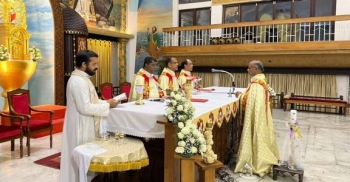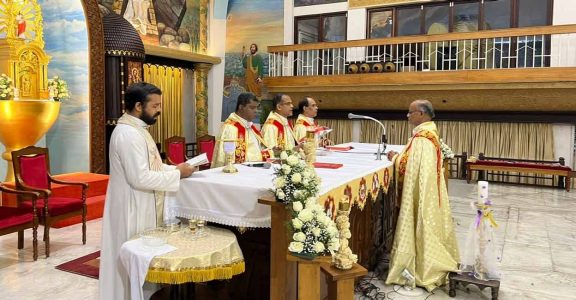
.png) Jacob Peenikaparambil
Jacob Peenikaparambil

Christmas is the most important festival of Christians all over the world, and it is a day of joy and happiness. Unfortunately, Christmas 2022 was the saddest Christmas for the faithful of the Syro-Malabar Church, especially the Catholic community of Ernakulam Basilica parish because of the tragic and shameful incidents that took place in the Basilica on 23rd and 24th December. The conflict within the Syro-Malabar Church regarding the mode of offering the Holy Mass took the form of violence between two groups in Ernakulam Cathedral Church while Eucharistic celebration was going on in the church on 23rd December. Christmas celebration was cancelled in the Basilica church because of the law-and-order problem.
In fact, the Catholic Church in India is being made a laughing stock before the followers of other faiths because of the repulsive and shameful incidents. The scenes of hurling abusive language and the violent clashes were flashed by T V channels. Videos of the violent scenes were circulated on social media platforms. Thus, the whole world came to know the hollowness of the faith of the so-called followers of Jesus. The followers of Jesus who are expected to be peace-makers became peace-breakers and a large police force was deployed within the church and outside the church. Unfortunately, the leadership of the Church remained mute without making any effort to bring the conflicting groups to the negotiation table. On the contrary, the indifference of the leadership of the Church to the violent clashes gives the impression that the leadership itself is behind the clashes by supporting a particular group.
According to the teachings of the Church, Eucharist is the centre of the Catholic faith and spiritual life, as it is the re-enactment of the life and death of Jesus, reminding the faithful to lead a life of love, forgiveness, sharing and thanksgiving. By participating in the Eucharist, the faithful get inspiration and strength to follow the way of Jesus. All Catholics are obliged to participate in the Eucharistic celebration on Sundays and other days of obligation. It is nothing but a sacrilege that two groups clashed while eucharistic celebration, the most important spiritual act, was going on. One fails to understand how a priest can start Holy Mass facing the altar while a Mass is already going on using the same altar, facing the people. It appeared to be an awkward drama. The ‘Synodal Mass’ begins by facing the congregation. But the Administrator of the Basilica, appointed by the apostolic administrator, stood facing the altar objecting to the Mass being celebrated in the Basilica. Eucharist was abused for settling scores; hence it is a desecration of the Eucharist and a sacrilege indeed.
The dispute on the mode of offering Mass in the Syro-Malabar Church is quite old and it was aggravated when the Syro-Malabar Bishops’ Synod decided by a majority to impose a uniform mode of celebrating Mass. The priests and faithful of some dioceses, especially of the Ernakulam-Angamaly Archdiocese, were against the Mass facing the altar. The bishops’ synod was aware of the opposition of the priests and the faithful of some dioceses. Instead of adopting a synodal approach of holding discussions with the priests and the faithful and arriving at a consensus, the bishops were in a hurry to impose their decision on faithful and priests. The bishops of the Syro-Malabar Synod could have waited for a few more years for arriving at consensus on the issue.
The Christian community, especially the Church in Kerala, is facing many challenges, Hindutva being the most significant. According to the Hindutva protagonists, Muslims, Christians and Communists are internal threats to the Hindu Nation. As per the theory of V D Savarkar, Muslims and Christians cannot be part of Hindu Nation, as their Punya Bhoomi is outside India. According to him, only those who consider India as their Pitru Bhoomi and Punya Bhoomi can be the members of the Hindu Nation. Various policies and laws adopted by the BJP governments both at the Centre and in the states since 2014 like Citizenship Amendment Act, Anti-conversion laws (Freedom of Religion Laws) and increasing violence on Muslims and Christians are clear signs of India becoming a de-facto Hindu nation.
It seems that the bishops of the Syro-Malabar Synod are not at all aware of the tectonic socio-political changes taking place in India since 2014. If they were aware of the danger at their footsteps, they would not have wasted the resource of the church by focusing on an insignificant issue of facing the altar or facing the people during the Mass. Just after the devastation caused by Covid 19, the ordinary people were struggling to cope with issues like unemployment, lack of livelihood, rising prices and various health problems. In addition, Kerala is also facing issues like the menace of increasing drug addiction by young people and large-scale migration of Catholic youth to Europe, Canada and Australia. Instead of responding to these issues creatively, the bishops resorted to a decision on a controversial issue that resulted in division, strife, enmity and scandals within the Syro-Malabar Church. What we witness today is the slow destruction of the Syro-Malabar Church and weakening of the Church in India through a great scandal that could have been avoided.
Many right-thinking people within the Church appealed to the leadership to give exception to the dioceses that wanted to follow the mode of celebrating the Holy Mass facing people in order maintain peace and harmony within the Church. There are many rites within the Catholic Church and Syro-Malabar rite is only one among them. If there can be various rites within the Church, there is no harm in giving exception to a few dioceses, allowing them to follow the mode of offering Holy Mass facing people. For more than 60 years, in many dioceses of the Syro-Malabar Church, Holy Mass was offered facing people. Facing people or facing the altar has nothing to do with the teachings of Jesus and the core teachings of the Catholic Church. It is only a traditional practice in some regions and it is not at all an essential dimension of Eucharistic celebration. Many parishes/Mass Centres of Syro Malabar dioceses in North India, continue to celebrate the Holy Mass facing the people.
Instead of responding to the opposition through dialogue to the imposition of the uniform way of celebrating Mass, the leadership adopted an authoritarian approach. The attempt of the Apostolic Administrator to celebrate the Holy Mass in Ernakulam Basilica church with the support of police was resisted by the priests and the faithful a few weeks ago. This incident resulted in violence in the Archbishops’ House by a group of faithful who support the Mass facing the altar. Interestingly, the Apostolic Administrator attempted to enter the Basilica to celebrate the Holy Mass facing the altar, while a dialogue was already initiated between two groups by three bishops of the Syro Malabar church.
After the unruly scenes of a group of faithful preventing the Apostolic Administrator from entering the Basilica and another group breaking chairs and furniture in the Archbishop’s House were circulated on the social media, nine bishops, both active and retired, of Ernakulam-Angamaly Archdiocese wrote a letter to the Major Archbishop and the Apostolic Administrator of Ernakulam-Angamaly Archdiocese not to precipitate the situation, but to hold dialogue with the priests and the faithful of the archdiocese to find an amicable solution. But there was no effect. If the bishops and priests are not able to listen to each other and find an amicable solution to the conflicting issues, what right do they have to remain in leadership positions, what moral authority do they have to instruct and guide the laity?
While the scandal and fight on the issue of celebrating Holy Mass continue without any resolution in sight, many dioceses in Kerala organized mega shows of Christmas Carol. God became a human being in the person of Jesus to teach human beings how to love each other. Jesus summarized all laws into a single law of loving one another. As the liturgical conflict continues, taking the form of violence, the cardinal law of love is blatantly violated. At the same time, public ex
Dialogue is the way of Jesus and it is the way promoted and recommended by Pope Francis in the form of Synodality. It is the only way to peace, harmony and unity, and not the use of brute force to impose uniformity in the name of Jesus, Church and Pope. The Church is the people of God and the priests and bishops are not masters and owners, but only custodians and stewards who are accountable to God and people of God. They have no right to be arrogant and proud and use power to impose their decisions on the people of God. Let Jesus in the manger bless the Church leaders to become humble servants and good shepherds who go after the lost sheep.